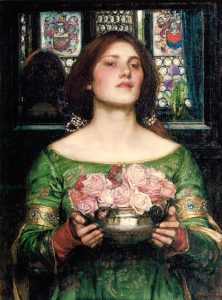
On these beautiful long summer evenings, I often go for walks to admire the sunset.
It is at these moments that I occasionally get nostalgia (remembering with fondness something that is past). I remember significant influences in my life – people I met and places I have been to – whenever I look at the clouds drifting away into the horizon.
There are moments when I feel as though the warm evening air is carrying my memories and thoughts away.
These experiences also remind me of something else: a beautiful passage in Charles Dickens’ David Copperfield (1850), one of my favourite Dickens’ novels (the other two being Little Dorrit (1857) and Bleak House (1852)).
As I read this passage again, I am struck by how many times David Copperfield the narrator (and Dickens the writer) use the Simple Past Tense (or Past Simple, as some call it).
This tense is very useful for retelling a story or describing a memory.
✍️ Let’s review briefly: the simple past is used to show completed actions that happened at a fixed point in the past, which explains how it differs from the continuous past.
✍️ On the other hand, when actions or events that were in progress at some point in the past, the Continuous Past (or Past Continuous) tense will be used. It is always constructed with the words “was” or “were” and the present participle (e.g., you were studying at university for four years). [1]
Now let’s look to David Copperfield and learn what we can from Dickens’ use of the Simple Past tense of over thirty verbs in this passage. I will highlight the simple past verbs below but will skip over the rest of the vocabulary in this Lesson. In today’s lesson, it is more important to focus on the verb forms. [2] 🔎 I would like you to pay attention to how often these verbs are used in storytelling.
The passage from David Copperfield is divided into four parts, each with a paraphrased (simplified description in my own words) of the classic text.
………
📘 PASSAGE FROM DAVID COPPERFIELD
I went away from England; not knowing, even then, how great the shock was, that I had to bear. I left all who were dear to me, and went away; and believed that I had borne it, and it was past. As a man upon a field of battle will receive a mortal hurt, and scarcely know that he is struck, so I, when I was left alone with my undisciplined heart, had no conception of the wound with which it had to strive.
The knowledge came upon me, not quickly, but little by little, and grain by grain. The desolate feeling with which I went abroad, deepened and widened hourly. At first it was a heavy sense of loss and sorrow, wherein I could distinguish little else. By imperceptible degrees, it became a hopeless consciousness of all that I had lost— love, friendship, interest; of all that had been shattered— my first trust, my first affection, the whole airy castle of my life; of all that remained— a ruined blank and waste, lying wide around me, unbroken, to the dark horizon …
I mourned for my child-wife, taken from her blooming world, so young. I mourned for him who might have won the love and admiration of thousands, as he had won mine long ago. I mourned for the broken heart that had found rest in the stormy sea; and for the wandering remnants of the simple home, where I had heard the night-wind blowing, when I was a child.
– Charles Dickens, David Copperfield (1850)
💠 This passage describes David Copperfield’s experience of grief (the great sadness felt after losing someone who was near and dear). He makes the decision to leave England, but he has no idea where he’s going to go or what he’s going to do because he’s still in shock at leaving his home country. His sole aim is to try to get off from his sadness. But his awareness of it – the ‘knowledge’ of it, as he describes it – grows ‘little by little, and grain by grain’. It widens and gets deeper.
Finally, his awareness of all the people he has lost — his wife and the two friends who died in an accident — begins to grow. He feels as if the ‘whole airy castle of my life’ has crumbled and fallen down. He finally reaches a point in which he can mourn (cry deeply about something lost) all that he has been keeping tightly within his heart.
Simple Past verb forms in this section:
went (simple past form) < to go (infinitive verb form)
was < to be
left < to leave
believed < to believe
came < to come
deepened < to deepen
widened < to widen
became < to become
…
📘 From the accumulated sadness into which I fell, I had at length no hope of ever issuing again. I roamed from place to place, carrying my burden with me everywhere. I felt its whole weight now; and I drooped beneath it, and I said in my heart that it could never be lightened.
… I passed on farther away, from city to city, seeking I know not what, and trying to leave I know not what behind. …
I was in Switzerland. I had come out of Italy, over one of the great passes of the Alps, and had since wandered with a guide among the by-ways of the mountains … I had found sublimity and wonder in the dread heights and precipices, in the roaring torrents, and the wastes of ice and snow …
– Charles Dickens, David Copperfield (1850)
💠 This section describes how he finally arrives in Switzerland after having travelled for a long time with no aim or purpose in mind. He has ‘roamed’ (move or travel about with no aim) from place to place carrying his ‘burden’ of sadness. It is heavy on his spirit; he droops (bends because of its weight).
But as he crosses the Alps (the mountain range) between Italy and Switzerland, he starts to find ‘sublimity’ (the quality of being extremely good, beautiful, or enjoyable) and ‘wonder’ in the beautiful nature he sees around him: the heights and sharp edges of the mountains (‘in the dread heights and precipices’), the noisy flow of rivers (‘in the roaring torrents’) and in the large areas of uninhabited land that is covered with snow and ice (‘the wastes of ice and snow’).
Can the natural beauty of Switzerland help him to heal from his pain?
Simple Past verb forms in this section:
fell (simple past form) < to fall (infinitive verb form)
roamed < to roam
felt < to feel
drooped < to droop
said < to say
passed < to pass
was < to be
…

📘 I came, one evening before sunset, down into a valley, where I was to rest … I think some long-unwonted sense of beauty and tranquillity, some softening influence awakened by its peace, moved faintly in my breast. I remember pausing once, with a kind of sorrow that was not all oppressive, not quite despairing. I remember almost hoping that some better change was possible within me.
I came into the valley, as the evening sun was shining on the remote heights of snow, that closed it in, like eternal clouds … Dotted here and there on the mountainside, each tiny dot a home, were lonely wooden cottages, so dwarfed by the towering heights that they appeared too small for toys. So did even the clustered village in the valley, with its wooden bridge across the stream, where the stream tumbled over broken rocks, and roared away among the trees. In the quiet air, there was a sound of distant singing— shepherd voices; but, as one bright evening cloud floated midway along the mountain’s-side, I could almost have believed it came from there, and was not earthly music. All at once, in this serenity, great Nature spoke to me; and soothed me to lay down my weary head upon the grass, and weep as I had not wept yet, since Dora died!
I had found a packet of letters awaiting me but a few minutes before, and had strolled out of the village to read them while my supper was making ready …
The packet was in my hand. I opened it, and read the writing of Agnes.
– Charles Dickens, David Copperfield (1850)
💠 One evening before sunset, David goes down into the valley. He experiences the ‘softening influenced’ of the landscape’s peacefulness; it moves faintly in his heart. He realises that his sorrow (deep sadness) no longer oppresses him (heavily overwhelms); he doesn’t feel the same despair as before. He begins to hope that some better change might be possible within him.
He describes the beautiful valley: the snowy heights of the mountains are reflecting the last rays of sunshine; there are tiny cottages dotting the valley’s landscape; he notices a village with a bridge over a river. He listens to the songs of shepherds and the flow of water from the river. He observes the clouds floating in the sky as if carrying the heavenly music.
Face to face with all this beauty, David suddenly bends down on the grass and cries his heart out. Since the passing of his young wife, Dora, he has been unable to cry all of his sorrow away.
When he has stopped crying, he recalls that moments earlier, at his hotel, he had discovered a packet of letters waiting for him. Upon opening it, he discovers a letter from his childhood friend Agnes, who continues to have a quiet, comfortable life in England with her father.
Simple Past verb forms in this section:
came (simple past tense) < to come (infinitive verb form)
was < to be
moved < to move
were < to be
appeared < to appear
tumbled < to tumble
roared < to roar
floated < to float
spoke < to speak
soothed < to soothe
opened < to open
read < to read
…

📘 She was happy and useful, was prospering as she had hoped. That was all she told me of herself. The rest referred to me.
She gave me no advice; she urged no duty on me; she only told me, in her own fervent manner, what her trust in me was. She knew (she said) how such a nature as mine would turn affliction to good. She knew how trial and emotion would exalt and strengthen it. She was sure that in my every purpose I should gain a firmer and a higher tendency, through the grief I had undergone. She, who so gloried in my fame, and so looked forward to its augmentation, well knew that I would labour on. She knew that in me, sorrow could not be weakness, but must be strength. As the endurance of my childish days had done its part to make me what I was, so greater calamities would nerve me on, to be yet better than I was; and so, as they had taught me, would I teach others. She commended me to God, who had taken my innocent darling to His rest; and in her sisterly affection cherished me always, and was always at my side go where I would; proud of what I had done, but infinitely prouder yet of what I was reserved to do.
I put the letter in my breast, and thought what had I been an hour ago! When I heard the voices die away, and saw the quiet evening cloud grow dim, and all the colours in the valley fade, and the golden snow upon the mountain-tops become a remote part of the pale night sky, yet felt that the night was passing from my mind, and all its shadows clearing, there was no name for the love I bore her, dearer to me, henceforward, than ever until then.
– Charles Dickens, David Copperfield (1850)
💠 It’s rare for Agnes to write about herself. She only says that she is ‘happy and useful’ at home. The rest of her letter is focused on David.
She encourages him, saying that everything he has gone through has been difficult. Nevertheless, she is sure that he is reliable and that all of his experiences will ultimately make him stronger. She knows that he is a hard worker, and tells him that she is proud of him. She promises to be like a loving sister to him who always cherishes him (believes him to be precious; greatly appreciates him). She looks forward to his future, to his accomplishing all he has been destined to do.
After putting the note in his pocket, he turns back to look at the sunset sun. As the sun disappears below the horizon and the sky becomes darker and darker, he feels as if the ‘night’ in his sad soul is actually coming to an end. He also comes to the realisation that Agnes is his true love, and he has never loved her more.
Simple Past verb forms in this section:
gave (simple past tense) < to give (infinitive verb form)
urged < to urge
told < to tell
knew < to know
said < to say
gloried < to glory (in)
looked < to look
commended < to commend
cherished < to cherish
put < to put
heard < to hear
felt < to feel

…
We have now finished reading for the time being.
How many of these simple past verb forms did you know? 🧐
If you heard or read them in a different context, do you think you would still be able to recognise them? 🤔
One day, you might find yourself thinking back on your history, just like David Copperfield did …
After today’s Lesson, you will remember how best to use the Simple Past to describe those memories. 💭
[1] Note: I have another Lesson specifically on the differences between these – together with examples from literature – here for you. It is worth checking out if you struggle with these!




